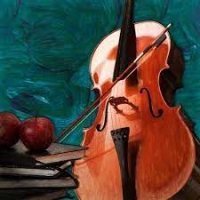Latest Sheet Music
Blues Brothers
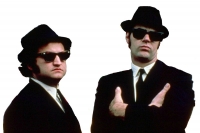
The Blues Brothers are an American blues and soul revivalist band founded in 1978 by comedians Dan Aykroyd and John Belushi as part of a musical sketch on Saturday Night Live. Belushi and Aykroyd fronted the band, in character, respectively, as lead vocalist 'Joliet' Jake Blues and harmonica player/vocalist Elwood Blues. The band was composed of well-known musicians, and debuted as the musical guest in a 1978 episode of Saturday Night Live, opening the show performing "Hey Bartender", and later "Soul Man".
Euphemia Allen
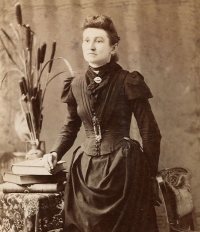
Euphemia Amelia Nightingale Allen (1861–1948) was a Scottish composer. She composed the song "The Celebrated Chop Waltz" or now known as "Chopsticks" in 1877, at the age of 16, under the pseudonym Arthur de Lulli. She was the sister of music publisher Mozart Allen.Allen was the daughter of William Elder Allen, a well-known dancing instructor in Glasgow, and Agnes Allen (née Letham). The 1901 Scotland Census states her occupation as 'teacher of the piano forte'. At the time of the census she was living with her brother E. J. Mozart Allen, his wife Christina, and their father William along with Mozart and Christina's three children.According to her death certificate, Allen was a retired music publisher. She never married.
Koji Kondo

Koji Kondo (近藤浩治 Kondō Kōji?, born August 13, 1960) is a Japanese video game composer and sound director who has been employed at Nintendo since 1984. He is best known for scoring numerous titles in the Mario and The Legend of Zelda series.
Peter Bird

Choral singer since 1964. Geophysicist since 1972; professor at UCLA since 1976; emeritus since 2011. Composer of choral music since 2005.
G.H. Matos Rodriguez

Gerardo Hernán Matos Rodríguez Montevideo, Uruguay, also known as Becho, was a Uruguayan musician, composer and journalist. Becho was not attributed to this Uruguayan musician. The term Becho is given to another Uruguayan violinist.
Felix Mendelssohn Bartholdy

Jakob Ludwig Felix Mendelssohn Bartholdy, born and widely known as Felix Mendelssohn, was a German composer, pianist, organist and conductor of the early Romantic period. Mendelssohn's compositions include symphonies, concertos, piano music and chamber music.
Alan Menken

Alan Menken (born July 22, 1949 in New Rochelle, New York) is an American Broadway and an eight-time Academy Award winning composer and pianist. Menken has collaborated with several renowned lyricists including Howard Ashman (1950-1991), Tim Rice and Stephen Schwartz.
Saint Saens

Charles-Camille Saint-Saëns (9 October 1835 – 16 December 1921) was a French composer, organist, conductor, and pianist, known especially for The Carnival of the Animals, Danse Macabre, Samson and Delilah, Havanaise, Introduction and Rondo capriccioso, and his Symphony No. 3 (Organ Symphony).
Mikael Tariverdiev
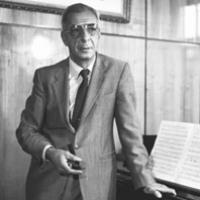
Mikael Tariverdiev (Russian: Микаэл Таривердиев; (15 August 1931, Tbilisi, Georgia - 24 June 1996, Sochi, Russia) was a prominent Soviet composer of Armenian descent. He headed the Composers' Guild of Soviet Cinematographers' Union from its inception.
He was born in Tbilisi, Georgian SSR to Armenian parents, but lived and worked in Russia. He graduated from Moscow Gnessin Institute (in the class of Aram Khachaturian).
He is an author of over 100 romances and 4 operas, including the comic opera Graf Cagliostro and monoopera "The Waiting". But he is best known for his music in many popular Soviet movies (more than 130 films, included "Seventeen Moments of Spring" and "The Irony of Fate" - see List of film music by Mikael Tariverdiev).
Mikael Tariverdiev was a recipient of many awards, including the USSR State Prize (1977) and the Prize of the American Music Academy (1975). He was awarded a title People's Artist of Russia in 1986. He won three Nika Awards for Best Composer in the 1990s.
The Best Music prize at the largest Russian National Film Festival Kinotaur is named after Tariverdiev. After the Tariverdiev's death a group of admirers of his music organized the Mikael Tariverdiev Charity Fund and Tariverdiev International Organ Competition.
He was born in Tbilisi, Georgian SSR to Armenian parents, but lived and worked in Russia. He graduated from Moscow Gnessin Institute (in the class of Aram Khachaturian).
He is an author of over 100 romances and 4 operas, including the comic opera Graf Cagliostro and monoopera "The Waiting". But he is best known for his music in many popular Soviet movies (more than 130 films, included "Seventeen Moments of Spring" and "The Irony of Fate" - see List of film music by Mikael Tariverdiev).
Mikael Tariverdiev was a recipient of many awards, including the USSR State Prize (1977) and the Prize of the American Music Academy (1975). He was awarded a title People's Artist of Russia in 1986. He won three Nika Awards for Best Composer in the 1990s.
The Best Music prize at the largest Russian National Film Festival Kinotaur is named after Tariverdiev. After the Tariverdiev's death a group of admirers of his music organized the Mikael Tariverdiev Charity Fund and Tariverdiev International Organ Competition.
Yann Tiersen

Guillaume Yann Tiersen (born 23 June 1970) is a French musician and composer known internationally for composing the score to the Jean-Pierre Jeunet movie Amélie. His music is recognized by its use of a large variety of instruments in relatively minimalist compositions, often with a touch of either European classical music or French folk music, using primarily the piano, accordion or violin together with instruments like the melodica, xylophone, toy piano, ondes martenot, harpsichord and typewriter. His musical style is reminiscent of Frédéric Chopin, Erik Satie, Philip Glass and Michael Nyman.
James Brown

James Joseph Brown, Jr. (May 3, 1933 – December 25, 2006), commonly referred to as "The Godfather of Soul", "King of Funk", and "The Hardest Working Man in Show Business", was an American entertainer. He is recognized as one of the most influential figures in 20th century popular music and was renowned for his vocals, and feverish dancing.
As a prolific singer, songwriter, bandleader, Brown was a pivotal force in the music industry. He left his mark on numerous artists. Brown's music also left its mark on the rhythms of African popular music, such as afrobeat, jùjú and mbalax, and provided a template for go-go music.
Brown began his professional music career in 1953, and rose to fame during the late 1950s and early 1960s on the strength of his thrilling live performances and string of smash hits. In spite of various personal problems and setbacks he continued to score hits in every decade through the 1980s. In addition to his acclaim in music, Brown was a presence in American political affairs during the 1960s and 1970s, noted especially for his activism on behalf of fellow African Americans and the poor. During the early 1980s, Brown's music helped to shape the rhythms of early hip-hop music, with numerous groups looping or sampling his funk grooves and turning them into what became hip hop classics and the foundations of the music genre.
Brown was recognized by numerous titles, including Soul Brother Number One, Sex Machine, Mr. Dynamite, The Hardest Working Man in Show Business, Minister of The New New Super Heavy Funk, Mr. Please Please Please, The Boss, and the best-known, the Godfather of Soul.
As a prolific singer, songwriter, bandleader, Brown was a pivotal force in the music industry. He left his mark on numerous artists. Brown's music also left its mark on the rhythms of African popular music, such as afrobeat, jùjú and mbalax, and provided a template for go-go music.
Brown began his professional music career in 1953, and rose to fame during the late 1950s and early 1960s on the strength of his thrilling live performances and string of smash hits. In spite of various personal problems and setbacks he continued to score hits in every decade through the 1980s. In addition to his acclaim in music, Brown was a presence in American political affairs during the 1960s and 1970s, noted especially for his activism on behalf of fellow African Americans and the poor. During the early 1980s, Brown's music helped to shape the rhythms of early hip-hop music, with numerous groups looping or sampling his funk grooves and turning them into what became hip hop classics and the foundations of the music genre.
Brown was recognized by numerous titles, including Soul Brother Number One, Sex Machine, Mr. Dynamite, The Hardest Working Man in Show Business, Minister of The New New Super Heavy Funk, Mr. Please Please Please, The Boss, and the best-known, the Godfather of Soul.
Nick Cave

Nicholas Edward "Nick" Cave (born 22 September 1957) is an Australian musician, songwriter, author, screenwriter, and occasional film actor.
He is best known for his work as a frontman of the critically acclaimed rock band Nick Cave and the Bad Seeds, established in 1984, a group known for its eclectic influences and musical styles. Before that, he had fronted the group The Birthday Party in the early 1980s, a band renowned for its highly dark, challenging lyrics and violent sound influenced by free jazz, blues, and post-punk. In 2006, he formed the garage rock band Grinderman that released its debut the following year. Cave's music is generally characterised by emotional intensity, a wide variety of influences, and lyrical obsessions with "religion, death, love, America, and violence."
Upon Cave's induction into the ARIA Hall of Fame, ARIA Awards committee chairman Ed St John said “Nick Cave has enjoyed—and continues to enjoy—one of the most extraordinary careers in the annals of popular music. He is an Australian artist like Sidney Nolan is an Australian artist—beyond comparison, beyond genre, beyond dispute."
He is best known for his work as a frontman of the critically acclaimed rock band Nick Cave and the Bad Seeds, established in 1984, a group known for its eclectic influences and musical styles. Before that, he had fronted the group The Birthday Party in the early 1980s, a band renowned for its highly dark, challenging lyrics and violent sound influenced by free jazz, blues, and post-punk. In 2006, he formed the garage rock band Grinderman that released its debut the following year. Cave's music is generally characterised by emotional intensity, a wide variety of influences, and lyrical obsessions with "religion, death, love, America, and violence."
Upon Cave's induction into the ARIA Hall of Fame, ARIA Awards committee chairman Ed St John said “Nick Cave has enjoyed—and continues to enjoy—one of the most extraordinary careers in the annals of popular music. He is an Australian artist like Sidney Nolan is an Australian artist—beyond comparison, beyond genre, beyond dispute."
Federico Moreno-Torroba
Federico Moreno Torroba was a Spanish composer, conductor, and theatrical impresario. He is especially remembered for his important contributions to the classical guitar repertoire, becoming one of the leading twentieth-century composers for the instrument.
Alessandro Scarlatti

Alessandro Scarlatti is an Italian classical composer of Baroque classical western music, especially famous for his opera works and room cantata. He is considered to be the finder of the opera genre of Naples school. His sons Domenico Scarlatti and Pietro Filippo Scarlatti are also well-known composers of classical western music.
Andre Waignien

André Waignein (28 January 1942 – 22 November 2015) was a Belgian composer, conductor, trumpeter, and musicologist. He is well known for his symphonies with over six hundred compositions at the time of his death. Waignein's symphonies were known to be lively and upbeat, and they reflected his character. He was a professor at the Conservatoire Royal de Bruxelles and a director at the Conservatoire de Tournai He wrote under the pseudonyms of Rita Defoort (the name of his wife), Rob Ares, Luc Gistel, Roland Kernen, and Larry Foster.
Burt Bacharach
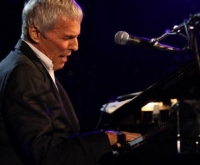
Burt Bacharach (born May 12, 1928) is an American pianist and composer. He is best known for his many pop hits from the early 1960s through the 1980s, with lyrics written by Hal David, many of which were produced for and recorded by Dionne Warwick.
As of 2006, Bacharach had written a total of 70 Top 40 hits in the US, and 52 Top 40 hits in the UK. According to britishhitsongwriters.com he is the eighteenth most successful songwriter in U.K. chart history based on weeks that his compositions have spent on the chart.
As of 2006, Bacharach had written a total of 70 Top 40 hits in the US, and 52 Top 40 hits in the UK. According to britishhitsongwriters.com he is the eighteenth most successful songwriter in U.K. chart history based on weeks that his compositions have spent on the chart.
Brahms

Johannes Brahms (May 7, 1833 â April 3, 1897) was a German composer of the Romantic period. He was born in Hamburg and in his later years he settled in Vienna, Austria.
Brahms maintained a Classical sense of form and order in his works â in contrast to the opulence of the music of many of his contemporaries. Thus many admirers (though not necessarily Brahms himself) saw him as the champion of traditional forms and "pure music," as opposed to the New German embrace of program music.
Brahms venerated Beethoven: in the composer's home, a marble bust of Beethoven looked down on the spot where he composed, and some passages in his works are reminiscent of Beethoven's style. The main theme of the finale of Brahms's First Symphony is reminiscent of the main theme of the finale of Beethoven's Ninth, and when this resemblance was pointed out to Brahms he replied that any ass â jeder Esel â could see that.
Ein deutsches Requiem was partially inspired by his mother's death in 1865, but also incorporates material from a Symphony he started in 1854, but abandoned following Schumann's suicide attempt. He once wrote that the Requiem "belonged to Schumann". The first movement of this abandoned Symphony was re-worked as the first movement of the First Piano Concerto.
Brahms also loved the Classical composers Mozart and Haydn. He collected first editions and autographs of their works, and edited performing editions. He also studied the music of pre-classical composers, including Giovanni Gabrieli, Johann Adolph Hasse, Heinrich Schütz and especially Johann Sebastian Bach. His friends included leading musicologists, and with Friedrich Chrysander he edited an edition of the works of François Couperin. He looked to older music for inspiration in the arts of strict counterpoint; the themes of some of his works are modelled on Baroque sources, such as Bach's The Art of Fugue in the fugal finale of Cello Sonata No. 1, or the same composer's Cantata No. 150 in the passacaglia theme of the Fourth Symphony's finale.
Brahms maintained a Classical sense of form and order in his works â in contrast to the opulence of the music of many of his contemporaries. Thus many admirers (though not necessarily Brahms himself) saw him as the champion of traditional forms and "pure music," as opposed to the New German embrace of program music.
Brahms venerated Beethoven: in the composer's home, a marble bust of Beethoven looked down on the spot where he composed, and some passages in his works are reminiscent of Beethoven's style. The main theme of the finale of Brahms's First Symphony is reminiscent of the main theme of the finale of Beethoven's Ninth, and when this resemblance was pointed out to Brahms he replied that any ass â jeder Esel â could see that.
Ein deutsches Requiem was partially inspired by his mother's death in 1865, but also incorporates material from a Symphony he started in 1854, but abandoned following Schumann's suicide attempt. He once wrote that the Requiem "belonged to Schumann". The first movement of this abandoned Symphony was re-worked as the first movement of the First Piano Concerto.
Brahms also loved the Classical composers Mozart and Haydn. He collected first editions and autographs of their works, and edited performing editions. He also studied the music of pre-classical composers, including Giovanni Gabrieli, Johann Adolph Hasse, Heinrich Schütz and especially Johann Sebastian Bach. His friends included leading musicologists, and with Friedrich Chrysander he edited an edition of the works of François Couperin. He looked to older music for inspiration in the arts of strict counterpoint; the themes of some of his works are modelled on Baroque sources, such as Bach's The Art of Fugue in the fugal finale of Cello Sonata No. 1, or the same composer's Cantata No. 150 in the passacaglia theme of the Fourth Symphony's finale.
Owl City
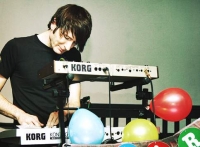
Owl City is an American synthpop musical project by Adam Young. Young started out making music in his parents' basement in Owatonna, Minnesota which he claims is a result of his insomnia.
Young's influences are disco and European electronic music. After two independent albums, Owl City gained mainstream popularity from the 2009 major label debut album Ocean Eyes, which spawned the U.S. Billboard Hot 100 #1 hit single "Fireflies". "Fireflies" topped the US and Canadian charts and became the most-downloaded song on iTunes in the US, and the album Ocean Eyes reached the top ten on the US album charts and topped the US electronic charts. Ocean Eyes also reached Amazon MP3's top 10 most downloaded album list. By December 2009, it was certified Gold in the United States.
Young's influences are disco and European electronic music. After two independent albums, Owl City gained mainstream popularity from the 2009 major label debut album Ocean Eyes, which spawned the U.S. Billboard Hot 100 #1 hit single "Fireflies". "Fireflies" topped the US and Canadian charts and became the most-downloaded song on iTunes in the US, and the album Ocean Eyes reached the top ten on the US album charts and topped the US electronic charts. Ocean Eyes also reached Amazon MP3's top 10 most downloaded album list. By December 2009, it was certified Gold in the United States.
Johnny Cash
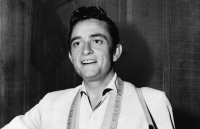
John R. Cash (born J. R. Cash; February 26, 1932 – September 12, 2003) was an American singer, songwriter, musician, and actor. Much of Cash's music contained themes of sorrow, moral tribulation, and redemption, especially in the later stages of his career. He was known for his deep, calm bass-baritone voice, the distinctive sound of his Tennessee Three backing band characterized by train-like chugging guitar rhythms, a rebelliousness coupled with an increasingly somber and humble demeanor, free prison concerts, and a trademark all-black stage wardrobe which earned him the nickname "The Man in Black".
Melodibog
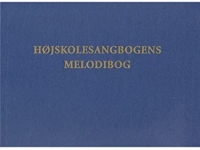
Melodibog A very nice study book containing all the notes of many songs.
Fredrik Pacius
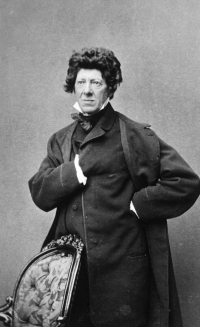
Fredrik Pacius was a German-Finnish composer and conductor who lived most of his life in Finland. He has been called the "Father of Finnish music". Pacius was born in Hamburg. He was appointed music teacher at the University of Helsinki in 1834.
Manoling Francisco, SJ

Manuel Simplicio Valdes Francisco was born and raised in QuezonCity, Philippines, on Feb. 26, 1965.
Scarlett
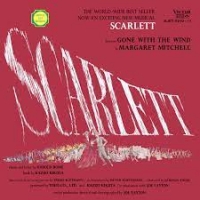
Scarlett is a 1970 musical with a score by Harold Rome. The original 1966 Japanese book is by Kazuo Kikuta, and was translated to English by Horton Foote. Based on Margaret Mitchell's 1936 bestseller Gone with the Wind, it traces the fate of self-centered Southern belle Scarlett O'Hara and her passionately turbulent relationship with dashing blockade runner Rhett Butler from the days prior to the American Civil War through the war itself and the following period of Reconstruction.
Britney Spears

Britney Jean Spears (born 2 December 1981) is an American singer and entertainer. Born in McComb, Mississippi and raised in Kentwood, Louisiana, Spears first appeared on national television as a contestant on the Star Search program in 1992 and went on to star on the television series The New Mickey Mouse Club from 1993–1994. After a brief membership with the pop musical group Innosense, Spears signed a recording contract with Jive Records, releasing her debut album ...Baby One More Time in 1999 which debuted at number one on the Billboard 200.
The title-track of Spears's debut album and its accompanying music video also established her as an international sex symbol, garnering controversy over the influence of her public image on teenage girls.
Spears is ranked as the eighth best-selling female recording artist in the United States according to the Recording Industry Association of America with 31 million certified albums and one of the world's best-selling music artists having sold an estimated 83 million records worldwide.
The title-track of Spears's debut album and its accompanying music video also established her as an international sex symbol, garnering controversy over the influence of her public image on teenage girls.
Spears is ranked as the eighth best-selling female recording artist in the United States according to the Recording Industry Association of America with 31 million certified albums and one of the world's best-selling music artists having sold an estimated 83 million records worldwide.
Metallica

Metallica is an American heavy metal band that formed in 1981 in Los Angeles, California. Founded when drummer Lars Ulrich posted an advertisement in a Los Angeles newspaper, Metallica's original line-up consisted of Ulrich, rhythm guitarist and vocalist James Hetfield, lead guitarist Dave Mustaine, and bassist Ron McGovney. These last two were later replaced from the band, in favor of Kirk Hammett and Cliff Burton, respectively. In September 1986, Metallica's tour bus skidded out of control and flipped, which resulted in Burton being crushed under the bus and killed. Jason Newsted replaced him less than two months later. Newsted left the band in 2001 and was replaced by Robert Trujillo in 2003.
Metallica's early releases included fast tempos, instrumentals, and aggressive musicianship that placed them as one of the "Big Four" of the thrash metal subgenre alongside Slayer, Megadeth and Anthrax. The band earned a growing fan base in the underground music community, and some critics say the 1986 release Master of Puppets is one of the most influential and "heavy" thrash metal albums. The band achieved substantial commercial success with its self-titled 1991 album, which debuted at number one on the Billboard 200. Some critics and fans believed the band changed its musical direction to appeal to the mainstream audience. With the release of Load in 1996, Metallica distanced itself from earlier releases in what has been described as "an almost alternative rock approach", and the band faced accusations of "selling out".
In 2000, Metallica was among several artists who filed a lawsuit against Napster for sharing the band's copyright-protected material for free without the band members' consent. A settlement was reached, and Napster became a pay-to-use service. Despite reaching number one on the Billboard 200, the release of St. Anger in 2003 disappointed some critics and fans with the exclusion of guitar solos, and the "steel-sounding" snare drum. A film titled Some Kind of Monster documented the recording process of St. Anger.
Metallica's early releases included fast tempos, instrumentals, and aggressive musicianship that placed them as one of the "Big Four" of the thrash metal subgenre alongside Slayer, Megadeth and Anthrax. The band earned a growing fan base in the underground music community, and some critics say the 1986 release Master of Puppets is one of the most influential and "heavy" thrash metal albums. The band achieved substantial commercial success with its self-titled 1991 album, which debuted at number one on the Billboard 200. Some critics and fans believed the band changed its musical direction to appeal to the mainstream audience. With the release of Load in 1996, Metallica distanced itself from earlier releases in what has been described as "an almost alternative rock approach", and the band faced accusations of "selling out".
In 2000, Metallica was among several artists who filed a lawsuit against Napster for sharing the band's copyright-protected material for free without the band members' consent. A settlement was reached, and Napster became a pay-to-use service. Despite reaching number one on the Billboard 200, the release of St. Anger in 2003 disappointed some critics and fans with the exclusion of guitar solos, and the "steel-sounding" snare drum. A film titled Some Kind of Monster documented the recording process of St. Anger.
Agustin Barrios
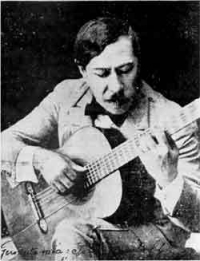
Agustín Pío Barrios (also known as Agustín Barrios Mangoré. May 5, 1885 - Aug 7 1944), an eminent Paraguayan guitarist and composer, was born May 5, 1885, in the department of Misiones, Paraguay and died August 7, 1944 in San Salvador, El Salvador. It has been generally accepted that the guitarist was born in San Juan Bautista in Misiones, however, there is no definitive proof of this as his baptismal document found in the book of registries in the cathedral in San Juan Bautista does not state his precise place of birth. Also, several biographers and authorities present convincing documented evidence that Barrios was born, instead, in the nearby town of Villa Florida, Misiones, situated on the Tebicuary River some 30 km north of San Juan Bautista.
Beach boys

The Beach Boys are an American rock band formed in Hawthorne, California in 1961. The group's original lineup consisted of brothers Brian, Dennis, and Carl Wilson, their cousin Mike Love, and their friend Al Jardine. Distinguished by their vocal harmonies and early surf songs, they are one of the most influential acts of the rock era. The band drew on the music of jazz-based vocal groups, 1950s rock and roll, and black R&B to create their unique sound, and with Brian as composer, arranger, producer, and de facto leader, they often incorporated classical elements and unconventional recording techniques in innovative ways.
ngo thuy mien

Ngô Quang Bình (sinh ngày 26 tháng 9 năm 1948), nghệ danh là Ngô Thụy Miên, là một nhạc sĩ thành danh tại Sài Gòn (Việt Nam) từ trước năm 1975, hiện đang cư trú tại Hoa Kỳ.Nhạc sĩ Ngô Thụy Miên sinh ngày 26 tháng 9 năm 1948 tại Hải Phòng, và là con thứ hai trong một gia đình bảy người con. Ông lớn lên trong môi trường sách vở và thơ văn, do gia đình ông có mở một nhà sách tên Thanh Bình ở thành phố Hải Phòng, và sau này ở trên đường Phan Đình Phùng (nay là đường Nguyễn Đình Chiểu) khi vào định cư ở Sài Gòn. Tại đây, ông học trường Trung học Nguyễn Trãi. và sau đó là Trường Đại học Khoa học Sài Gòn.
Mozart

Wolfgang Amadeus Mozart, full name Johann Chrysostom Wolfgang Amadeus Mozart (27 January 1756 â 5 December 1791) was a prolific and influential composer of the Classical era. His over 600 compositions include works widely acknowledged as pinnacles of symphonic, concertante, chamber, piano, operatic, and choral music. Mozart is among the most enduringly popular of classical composers, and many of his works are part of the standard concert repertoire.
Mozart's music, like Haydn's, stands as an archetypal example of the Classical style. His works spanned the period during which that style transformed from one exemplified by the style galant to one that began to incorporate some of the contrapuntal complexities of the late Baroque, complexities against which the galant style had been a reaction. Mozart's own stylistic development closely paralleled the development of the classical style as a whole. In addition, he was a versatile composer and wrote in almost every major genre, including symphony, opera, the solo concerto, chamber music including string quartet and string quintet, and the piano sonata. While none of these genres were new, the piano concerto was almost single-handedly developed and popularized by Mozart. He also wrote a great deal of religious music, including masses; and he composed many dances, divertimenti, serenades, and other forms of light entertainment.
The central traits of the classical style can be identified in Mozart's music. Clarity, balance, and transparency are hallmarks of his work.
Mozart's music, like Haydn's, stands as an archetypal example of the Classical style. His works spanned the period during which that style transformed from one exemplified by the style galant to one that began to incorporate some of the contrapuntal complexities of the late Baroque, complexities against which the galant style had been a reaction. Mozart's own stylistic development closely paralleled the development of the classical style as a whole. In addition, he was a versatile composer and wrote in almost every major genre, including symphony, opera, the solo concerto, chamber music including string quartet and string quintet, and the piano sonata. While none of these genres were new, the piano concerto was almost single-handedly developed and popularized by Mozart. He also wrote a great deal of religious music, including masses; and he composed many dances, divertimenti, serenades, and other forms of light entertainment.
The central traits of the classical style can be identified in Mozart's music. Clarity, balance, and transparency are hallmarks of his work.
Ernest Chausson
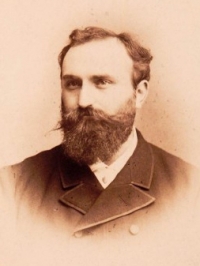
Amédée-Ernest Chausson (French: ; 20 January 1855 – 10 June 1899) was a French Romantic composer who died just as his career was beginning to flourish.Born in Paris into an affluent bourgeois family, Ernest Chausson was the sole surviving child of a building contractor who had made his fortune assisting Baron Haussmann in the redevelopment of Paris in the 1850s. To please his father, Chausson studied law and was appointed a barrister for the Court of Appeals, but had little or no interest in the profession.
Llibre Vermell deMontserrat
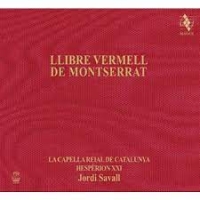
The Llibre Vermell de Montserrat is a manuscript collection of devotional texts containing, amongst others, some late medieval songs.
Bach

Johann Sebastian Bach (31 March 1685 – 28 July 1750) was a German composer and organist whose sacred and secular works for choir, orchestra, and solo instruments drew together the strands of the Baroque period and brought it to its ultimate maturity. Although he introduced no new forms, he enriched the prevailing German style with a robust contrapuntal technique, an unrivalled control of harmonic and motivic organisation in composition for diverse musical forces, and the adaptation of rhythms and textures from abroad, particularly Italy and France.
Revered for their intellectual depth and technical and artistic beauty, Bach's works include the Brandenburg concertos; the Goldberg Variations; the English Suites, French Suites, Partitas, and Well-Tempered Clavier; the Mass in B Minor; the St. Matthew Passion; the St. John Passion; The Musical Offering; The Art of Fugue; the Sonatas and Partitas for violin solo; the Cello Suites; more than 200 surviving cantatas; and a similar number of organ works, including the celebrated Toccata and Fugue in D Minor.
While Bach's fame as an organist was great during his lifetime, he was not particularly well-known as a composer. His adherence to Baroque forms and contrapuntal style was considered "old-fashioned" by his contemporaries, especially late in his career when the musical fashion tended towards Rococo and later Classical styles. A revival of interest and performances of his music began early in the 19th century, and he is now widely considered to be one of the greatest composers in the Western tradition.
Revered for their intellectual depth and technical and artistic beauty, Bach's works include the Brandenburg concertos; the Goldberg Variations; the English Suites, French Suites, Partitas, and Well-Tempered Clavier; the Mass in B Minor; the St. Matthew Passion; the St. John Passion; The Musical Offering; The Art of Fugue; the Sonatas and Partitas for violin solo; the Cello Suites; more than 200 surviving cantatas; and a similar number of organ works, including the celebrated Toccata and Fugue in D Minor.
While Bach's fame as an organist was great during his lifetime, he was not particularly well-known as a composer. His adherence to Baroque forms and contrapuntal style was considered "old-fashioned" by his contemporaries, especially late in his career when the musical fashion tended towards Rococo and later Classical styles. A revival of interest and performances of his music began early in the 19th century, and he is now widely considered to be one of the greatest composers in the Western tradition.
Paganini

Niccolò Paganini (27 October 1782 – 27 May 1840) was an Italian violinist, violist, guitarist, and composer. He was one of the most celebrated violin virtuosi of his time, and left his mark as one of the pillars of modern violin technique. His caprice in A minor, Op. 1 No. 24 is among his best known of compositions, and serves as inspiration for many prominent artists.
Paganini composed his own works to play exclusively in his concerts, all of which had profound influences on the evolution of violin techniques. His 24 Caprices were probably composed in the period between 1805 to 1809, while he was in the service of the Baciocchi court. Also during this period, he composed the majority of the solo pieces, duo-sonatas,trios and quartets for the guitar. These chamber works may have been inspired by the publication, in Lucca, of the guitar quintets of Boccherini. Many of his variations (and he has become the de facto master of this musical genre), including Le Streghe, The Carnival of Venice, and Nel cor più non mi sento, were composed, or at least first performed, before his European concert tour.
Playbill of Paganini's concert at the Covent Garden in 1832. Note that all solo pieces were of his composition, which was typical of all his concerts.
Generally speaking, Paganini's compositions were technically imaginative, and the timbre of the instrument was greatly expanded as a result of these works. Sounds of different musical instruments and animals were often imitated. One such composition was titled Il Fandango Spanolo (The Spanish Dance), which featured a series of humorous imitations of farm animals. Even more outrageous was a solo piece Duetto Amoroso, in which the sighs and groans of lovers were intimately depicted on the violin. Fortunately there survives a manuscript of the Duetto which has been recorded, while the existence of the Fandango is known only through concert posters.
However, his works were criticized for lacking characteristics of true polyphonism, as pointed out by Eugène Ysaÿe. Yehudi Menuhin, on the other hand, suggested that this might have been the result of his reliance on the guitar (in lieu of the piano) as an aid in composition. The orchestral parts for his concertos were often polite, unadventurous, and clearly supportive of the soloist. In this, his style is consistent with that of other Italian composers such as Paisiello, Rossini and Donizetti, who were influenced by the guitar-song milieu of Naples during this period.
Paganini was also the inspiration of many prominent composers. Both "La Campanella" and the A minor caprice (Nr. 24) have been an object of interest for a number of composers. Franz Liszt, Johannes Brahms, Sergei Rachmaninoff, Boris Blacher, Andrew Lloyd Webber, George Rochberg and Witold Lutosławski, among others, wrote well-known variations on these themes.
Paganini composed his own works to play exclusively in his concerts, all of which had profound influences on the evolution of violin techniques. His 24 Caprices were probably composed in the period between 1805 to 1809, while he was in the service of the Baciocchi court. Also during this period, he composed the majority of the solo pieces, duo-sonatas,trios and quartets for the guitar. These chamber works may have been inspired by the publication, in Lucca, of the guitar quintets of Boccherini. Many of his variations (and he has become the de facto master of this musical genre), including Le Streghe, The Carnival of Venice, and Nel cor più non mi sento, were composed, or at least first performed, before his European concert tour.
Playbill of Paganini's concert at the Covent Garden in 1832. Note that all solo pieces were of his composition, which was typical of all his concerts.
Generally speaking, Paganini's compositions were technically imaginative, and the timbre of the instrument was greatly expanded as a result of these works. Sounds of different musical instruments and animals were often imitated. One such composition was titled Il Fandango Spanolo (The Spanish Dance), which featured a series of humorous imitations of farm animals. Even more outrageous was a solo piece Duetto Amoroso, in which the sighs and groans of lovers were intimately depicted on the violin. Fortunately there survives a manuscript of the Duetto which has been recorded, while the existence of the Fandango is known only through concert posters.
However, his works were criticized for lacking characteristics of true polyphonism, as pointed out by Eugène Ysaÿe. Yehudi Menuhin, on the other hand, suggested that this might have been the result of his reliance on the guitar (in lieu of the piano) as an aid in composition. The orchestral parts for his concertos were often polite, unadventurous, and clearly supportive of the soloist. In this, his style is consistent with that of other Italian composers such as Paisiello, Rossini and Donizetti, who were influenced by the guitar-song milieu of Naples during this period.
Paganini was also the inspiration of many prominent composers. Both "La Campanella" and the A minor caprice (Nr. 24) have been an object of interest for a number of composers. Franz Liszt, Johannes Brahms, Sergei Rachmaninoff, Boris Blacher, Andrew Lloyd Webber, George Rochberg and Witold Lutosławski, among others, wrote well-known variations on these themes.
Miles Davis

Miles Dewey Davis III (May 26, 1926 – September 28, 1991) was an American trumpeter, bandleader, and composer.
Widely considered one of the most influential musicians of the 20th century, Miles Davis was, with his musical groups, at the forefront of several major developments in jazz music, including bebop, cool jazz, hard bop, modal jazz, and jazz fusion. Many well-known musicians rose to prominence as members of Davis' ensembles, including saxophonists Gerry Mulligan, John Coltrane, Cannonball Adderley, George Coleman, Wayne Shorter, Dave Liebman, Branford Marsalis and Kenny Garrett; trombonist J. J. Johnson; pianists Horace Silver, Red Garland, Wynton Kelly, Bill Evans, Herbie Hancock, Joe Zawinul, Chick Corea, and Keith Jarrett; guitarists John McLaughlin, Pete Cosey, John Scofield and Mike Stern; bassists Paul Chambers, Ron Carter, Dave Holland, Marcus Miller and Darryl Jones ; and drummers Philly Joe Jones, Jimmy Cobb, Tony Williams, Billy Cobham, Jack DeJohnette, and Al Foster.
On October 7, 2008, his album Kind of Blue, released in 1959, received its fourth platinum certification from the RIAA, signifying sales of 4 million copies. Miles Davis was inducted into the Rock and Roll Hall of Fame in 2006. Davis was noted as "one of the key figures in the history of jazz".
On November 5, 2009, Rep. John Conyers of Michigan sponsored a measure in the US House of Representatives to recognize and commemorate the album Kind of Blue on its 50th anniversary. The measure also affirms jazz as a national treasure and "encourages the United States government to preserve and advance the art form of jazz music." It passed, unanimously, with a vote of 409–0 on December 15, 2009.
Widely considered one of the most influential musicians of the 20th century, Miles Davis was, with his musical groups, at the forefront of several major developments in jazz music, including bebop, cool jazz, hard bop, modal jazz, and jazz fusion. Many well-known musicians rose to prominence as members of Davis' ensembles, including saxophonists Gerry Mulligan, John Coltrane, Cannonball Adderley, George Coleman, Wayne Shorter, Dave Liebman, Branford Marsalis and Kenny Garrett; trombonist J. J. Johnson; pianists Horace Silver, Red Garland, Wynton Kelly, Bill Evans, Herbie Hancock, Joe Zawinul, Chick Corea, and Keith Jarrett; guitarists John McLaughlin, Pete Cosey, John Scofield and Mike Stern; bassists Paul Chambers, Ron Carter, Dave Holland, Marcus Miller and Darryl Jones ; and drummers Philly Joe Jones, Jimmy Cobb, Tony Williams, Billy Cobham, Jack DeJohnette, and Al Foster.
On October 7, 2008, his album Kind of Blue, released in 1959, received its fourth platinum certification from the RIAA, signifying sales of 4 million copies. Miles Davis was inducted into the Rock and Roll Hall of Fame in 2006. Davis was noted as "one of the key figures in the history of jazz".
On November 5, 2009, Rep. John Conyers of Michigan sponsored a measure in the US House of Representatives to recognize and commemorate the album Kind of Blue on its 50th anniversary. The measure also affirms jazz as a national treasure and "encourages the United States government to preserve and advance the art form of jazz music." It passed, unanimously, with a vote of 409–0 on December 15, 2009.
Andrew Lloyd Webber

Andrew Lloyd Webber, Baron Lloyd-Webber (born 22 March 1948) is an English composer of musical theatre, the elder son of organist William Lloyd Webber and brother of the cellist Julian Lloyd Webber. Lloyd Webber started composing at the age of six, and published his first piece at the age of nine.
Lloyd Webber has achieved great popular success, with several musicals that have run for more than a decade both in the West End and on Broadway. He has composed 13 musicals, a song cycle, a set of variations, two film scores, and a Latin Requiem Mass. He has also gained a number of honours, including a knighthood in 1992, followed by a peerage from the British Government for services to Music, seven Tony Awards (and 40 nominations), three Grammy Awards (with an additional 60 nominations), an Academy Award (two other nominations), seven Olivier Awards (with 100 nominations), a Golden Globe, and the Kennedy Center Honors in 2006. Several of his songs, notably "The Music of the Night" from The Phantom of the Opera, "I Don't Know How to Love Him" from Jesus Christ Superstar, "Don't Cry for Me, Argentina" from Evita, "Any Dream Will Do" from Joseph and the Amazing Technicolor Dreamcoat and "Memory" from Cats have been widely recorded and were hits outside of their parent musicals. His company, the Really Useful Group, is one of the largest theatre operators in London.
Producers in several parts of the UK have staged productions, including national tours, of Lloyd Webber's musicals under licence from the Really Useful Group. According to britishhitsongwriters.com, he is the one hundredth most successful songwriter in U.K. singles chart history, based on weeks that his compositions have spent on the chart.
Lloyd Webber has achieved great popular success, with several musicals that have run for more than a decade both in the West End and on Broadway. He has composed 13 musicals, a song cycle, a set of variations, two film scores, and a Latin Requiem Mass. He has also gained a number of honours, including a knighthood in 1992, followed by a peerage from the British Government for services to Music, seven Tony Awards (and 40 nominations), three Grammy Awards (with an additional 60 nominations), an Academy Award (two other nominations), seven Olivier Awards (with 100 nominations), a Golden Globe, and the Kennedy Center Honors in 2006. Several of his songs, notably "The Music of the Night" from The Phantom of the Opera, "I Don't Know How to Love Him" from Jesus Christ Superstar, "Don't Cry for Me, Argentina" from Evita, "Any Dream Will Do" from Joseph and the Amazing Technicolor Dreamcoat and "Memory" from Cats have been widely recorded and were hits outside of their parent musicals. His company, the Really Useful Group, is one of the largest theatre operators in London.
Producers in several parts of the UK have staged productions, including national tours, of Lloyd Webber's musicals under licence from the Really Useful Group. According to britishhitsongwriters.com, he is the one hundredth most successful songwriter in U.K. singles chart history, based on weeks that his compositions have spent on the chart.
Rimsky-Korsakov
Nikolai Andreyevich Rimsky-Korsakov (Russian: Никола́й Андре́евич Ри́мский-Ко́рсаков, Nikolaj Andreevič Rimskij-Korsakov, Russian pronunciation: ) (18 March 1844, – 21 June 1908) was a Russian composer, and a member of the group of composers known as The Five. He was a master of orchestration. His best-known orchestral compositions—Capriccio Espagnol, the Russian Easter Festival Overture, and the symphonic suite Scheherazade—are considered staples of the classical music repertoire, along with suites and excerpts from some of his 15 operas. Scheherazade is an example of his frequent use of fairy tale and folk subjects.
Rimsky-Korsakov believed, as did fellow composer Mily Balakirev and critic Vladimir Stasov, in developing a nationalistic style of classical music. This style employed Russian folk song and lore along with exotic harmonic, melodic and rhythmic elements in a practice known as musical orientalism, and eschewed traditional Western compositional methods. However, Rimsky-Korsakov appreciated Western musical techniques after he became a professor of musical composition, harmony and orchestration at the Saint Petersburg Conservatory in 1871. He undertook a rigorous three-year program of self-education and became a master of Western methods, incorporating them alongside the influences of Mikhail Glinka and fellow members of The Five. His techniques of composition and orchestration were further enriched by his exposure to the works of Richard Wagner.
Rimsky-Korsakov believed, as did fellow composer Mily Balakirev and critic Vladimir Stasov, in developing a nationalistic style of classical music. This style employed Russian folk song and lore along with exotic harmonic, melodic and rhythmic elements in a practice known as musical orientalism, and eschewed traditional Western compositional methods. However, Rimsky-Korsakov appreciated Western musical techniques after he became a professor of musical composition, harmony and orchestration at the Saint Petersburg Conservatory in 1871. He undertook a rigorous three-year program of self-education and became a master of Western methods, incorporating them alongside the influences of Mikhail Glinka and fellow members of The Five. His techniques of composition and orchestration were further enriched by his exposure to the works of Richard Wagner.
Paul Rardin
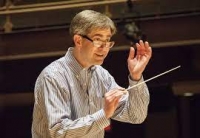
Paul Rardin is Elaine Brown Chair of Choral Music and Chair of the Vocal Arts Department at Temple University, where he conducts the Concert Choir, teaches graduate conducting, and oversees the seven-choir program at Temple’s Boyer College of Music and Dance. He is also Artistic Director of the Mendelssohn Club of Philadelphia. Rardin previously taught at the University of Michigan and Towson University, where his choirs appeared with the Kirov Orchestra of the Mariinsky Theatre, Baltimore Symphony Orchestra, and Baltimore Choral Arts Society. His choirs have performed for NCCO national conferences and ACDA division conferences. In 2015 the Temple University Concert Choir performed with the Philadelphia Orchestra in Bernstein’s MASS under the direction of Yannick Nézet-Séguin, and in 2016 the ensemble performed Bach motets with Helmuth Rilling.
Rodion Shchedrin
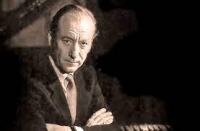
Rodion Konstantinovich Shchedrin is a Soviet and Russian composer and pianist, winner of USSR State Prize, the Lenin Prize, and the State Prize of the Russian Federation, and is a former member of the Inter-regional Deputies Group. He is also a citizen of Lithuania and Spain.
Versailles
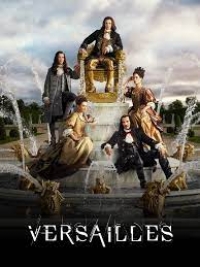
It's 1667 and 28-year-old King Louis XIV has finally taken over sole command of France. When he commissions Versailles, Europe's most beautiful palace, the nobles seek entry into the lavish residence, which they do not realize is meant to imprison and control them. Among the ruler's prime targets is…
Red Garland

William McKinley "Red" Garland, Jr. was an American modern jazz pianist. Known for his work as a bandleader and during the 1950s with Miles Davis, Garland helped popularize the block chord style of piano playing
Vasily Solovyov-Sedoi
Vasily Pavlovich Solovyov-Sedoi was a Soviet and Russian classical composer and songwriter who was born and died in Leningrad. Solovyov-Sedoi composed, among others, the music for the songs Solov'i and Moscow Nights. He also wrote music for numerous films.
Beethoven

Ludwig van Beethoven (16 December 1770 - 26 March 1827) was a German composer and pianist. He was a crucial figure in the transitional period between the Classical and Romantic eras in Western classical music, and remains one of the most respected and influential composers of all time.
Born in Bonn, then in the Electorate of Cologne (now in modern-day Germany), he moved to Vienna in his early twenties and settled there, studying with Joseph Haydn and quickly gaining a reputation as a virtuoso pianist. Beethoven's hearing gradually deteriorated beginning in his twenties, yet he continued to compose masterpieces, and to conduct and perform, even after he was completely deaf.
Born in Bonn, then in the Electorate of Cologne (now in modern-day Germany), he moved to Vienna in his early twenties and settled there, studying with Joseph Haydn and quickly gaining a reputation as a virtuoso pianist. Beethoven's hearing gradually deteriorated beginning in his twenties, yet he continued to compose masterpieces, and to conduct and perform, even after he was completely deaf.
Bobby McFerrin

Robert "Bobby" McFerrin Jr. (born in Manhattan, New York, on March 11, 1950) is a jazz-influenced a cappella vocal performer and conductor. He is best known for his 1988 hit song "Don't Worry, Be Happy".
McFerrin is known for his singing technique. Using his unusually large vocal range of four octaves, in many performances he switches rapidly fluidly between normal and falsetto registers to create polyphonic effects, effectively performing both the main melody and the accompanying parts of songs. He makes use of vocal percussion created both with his mouth and by tapping on his chest. McFerrin is also capable of throat singing — a practice common in central Asian regions such as Tuva and Tibet — in which the singer excites the natural overtones from the fundamental vocal pitch, producing a two-or three-part chord of notes from one voice.
A notable document of McFerrin's approach to singing is his 1984 album The Voice, the first solo vocal jazz album recorded with no accompaniment or overdubbing.
McFerrin is known for his singing technique. Using his unusually large vocal range of four octaves, in many performances he switches rapidly fluidly between normal and falsetto registers to create polyphonic effects, effectively performing both the main melody and the accompanying parts of songs. He makes use of vocal percussion created both with his mouth and by tapping on his chest. McFerrin is also capable of throat singing — a practice common in central Asian regions such as Tuva and Tibet — in which the singer excites the natural overtones from the fundamental vocal pitch, producing a two-or three-part chord of notes from one voice.
A notable document of McFerrin's approach to singing is his 1984 album The Voice, the first solo vocal jazz album recorded with no accompaniment or overdubbing.
Super Junior

Super Junior (Korean: 슈퍼주니어; Syupeo Junieo), also known as SJ or SuJu, is a South Korean boy band debuted on November 6, 2005, by producer Lee Soo-man of SM Entertainment. They are also dubbed by the media and Korean Music Awards as the "King of Hallyu Wave" due to their prominent contributions in Korean Wave. The group comprised a total of thirteen members at its peak. Super Junior originally debuted with twelve members, consisting of leader Leeteuk, Heechul, Han Geng, Yesung, Kangin, Shindong, Sungmin, Eunhyuk, Donghae, Siwon, Ryeowook, and Kibum. Kyuhyun joined the group later in 2006.
Lennie Niehaus
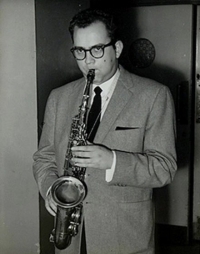
Leonard Niehaus (June 11, 1929 – May 28, 2020) was an American alto saxophonist, composer and arranger on the West Coast jazz scene. He played with the Stan Kenton Orchestra and served as one of Kenton's primary staff arrangers. He also played with Ray Vasquez and trombonist and Vocalist, Phil Carreon and other jazz bands on the U.S. West Coast. Niehaus had a close association as composer and arranging to motion pictures produced by Clint Eastwood.
Bill Rose
Billy Rose was an American impresario, theatrical showman and lyricist. For years both before and after World War II, Billy Rose was a major force in entertainment, with shows such as Billy Rose's Crazy Quilt, Jumbo, Billy Rose's Aquacade, and Carmen Jones
Maxence Cyrin
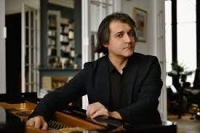
Maxence Cyrin is a French pianist and composer living in Paris.As a child, Cyrin studied classical piano at a conservatory. In his teenage years, he was exposed to new-wave and techno, greatly influencing his first recordings, also made during these years. He subsequently made recordings with independent electro labels. A few years later, he recorded an LP of piano compositions titled Instants on independent record label Sine Terra Firma, which has also released Yann Tiersen's debut album.
Music theory

Music theory is the study of the practices and possibilities of music. The Oxford Companion to Music describes three interrelated uses of the term "music theory"
John Jacobson

John is the founder of Music Express and the magazine's Senior Contributing Writer. He is an internationally recognized music educator, choreographer, and author. His works are published exclusively through Hal Leonard LLC.
Seth Woodard

Seth Woodard's Music and Design for Marching Band and Percussion.
Henry Marshall
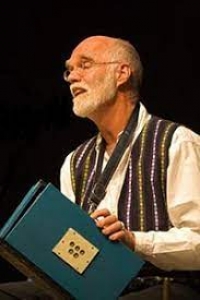
Henry Marshall. Primary Artist, Producer, Composer, Main Personnel, Vocals, Unknown Instrument,
George Gershwin

George Gershwin (September 26, 1898 – July 11, 1937) was an American composer. He wrote most of his vocal and theatrical works in collaboration with his elder brother, lyricist Ira Gershwin. George Gershwin composed songs both for Broadway and for the classical concert hall. He also wrote popular songs with success.
Many of his compositions have been used on television and in numerous films, and many became jazz standards. The jazz singer Ella Fitzgerald recorded many of the Gershwins' songs on her 1959 Gershwin Songbook (arranged by Nelson Riddle). Countless singers and musicians have recorded Gershwin songs, including Fred Astaire, Louis Armstrong, Al Jolson, Bobby Darin, Art Tatum, Bing Crosby, Janis Joplin, John Coltrane, Frank Sinatra, Billie Holiday, Sam Cooke, Miles Davis, Herbie Hancock, Madonna, Judy Garland, Julie Andrews, Barbra Streisand, Marni Nixon, Natalie Cole, Patti Austin, Nina Simone, Maureen McGovern, John Fahey, The Residents, Than & Sam, Sublime, and Sting. A residential building is named after him on the Stony Brook University campus.
Many of his compositions have been used on television and in numerous films, and many became jazz standards. The jazz singer Ella Fitzgerald recorded many of the Gershwins' songs on her 1959 Gershwin Songbook (arranged by Nelson Riddle). Countless singers and musicians have recorded Gershwin songs, including Fred Astaire, Louis Armstrong, Al Jolson, Bobby Darin, Art Tatum, Bing Crosby, Janis Joplin, John Coltrane, Frank Sinatra, Billie Holiday, Sam Cooke, Miles Davis, Herbie Hancock, Madonna, Judy Garland, Julie Andrews, Barbra Streisand, Marni Nixon, Natalie Cole, Patti Austin, Nina Simone, Maureen McGovern, John Fahey, The Residents, Than & Sam, Sublime, and Sting. A residential building is named after him on the Stony Brook University campus.
William Byrd

William Byrd (/bɜːrd/; birth date variously given as c.1539/40 or 1543 – 4 July 1623), was an English composer of the Renaissance. He wrote in many of the forms current in England at the time, including various types of sacred and secular polyphony, keyboard (the so-called Virginalist school), and consort music. Although he produced sacred music for Anglican services, sometime during the 1570s he became a Roman Catholic and wrote Catholic sacred music later in his life.
 Sheet Music Max is a site for those who wants to access popular sheet music easily,
letting them download the sheet music for free for trial purposes.
It's completely free to download and try the listed sheet music, but you have to delete the files after 24 hours of trial.
Don't forget, if you like the piece of music you have just learned playing,
treat the artist with respect, and go buy the original sheet music.
Sheet Music Max is a site for those who wants to access popular sheet music easily,
letting them download the sheet music for free for trial purposes.
It's completely free to download and try the listed sheet music, but you have to delete the files after 24 hours of trial.
Don't forget, if you like the piece of music you have just learned playing,
treat the artist with respect, and go buy the original sheet music.



